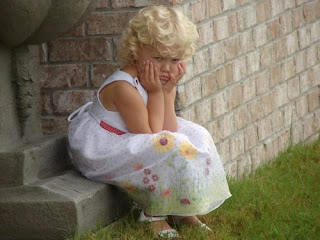The “terrible two’s” reference the ages of 12-36 months. We use this term because children tend to act up more and become more demanding during this time. Parents also feel the behavior presents itself most with an audience such as in public. They feel the child is almost waiting to be around others and in a certain sense, they are. During this age, children are trying to push their boundaries and challenge their limits. They not only want to see the how and why of things, but they also want to see reactions from others. As hard as it is to accept, this is all part of their normal develop, but it can be gotten through:
Normal Development:
Toddlers are at an age when they no longer want to be in one place. They’re learning to walk, talk, and explore their environment. During this course of exploration it would make sense to think they would at some point challenge their environment. However, since parents see their children as cute and adorable, they find it hard to tell them no, but as parents it’s our job to teach our children right from wrong. Beginning at the minute of birth, children are living sponges who soak up all the information we give them as well as become thinking, rationalizing people. If parents consistently give in to their children, they’re unable to learn boundaries, inappropriate behaviors, and the consequences for those behaviors. They need to understand from the beginning what is okay and what is not. Letting something slide once, but trying to consequence for the same behavior later, will only lead to confusion for the child. NO means NO and don’t be afraid to stand your ground.
Avoiding Temptation:
Toddlers don’t inherently know what’s dangerous or harmful for them. For example, they don’t know pulling on a dog’s ear may cause them to get bit and some medications aren’t candy. Our first job as parents is to keep our children safe so it’s best practice to keep harmful and dangerous objects out of sight. Even though they understand no, as with any age child, it doesn’t always mean they are going to listen. We all have seen that when a toddler gets something in their hand, the first place it goes is their mouth. Since children at this age are constantly exploring their environment, it’s just best practice they not learn certain lesions through trial and error.
Discipline:
Toddlers often want what they want, when they want it, and don’t do well having to wait for it. So if they feel there’s a chance they can get it themselves, they‘ll take matters into their own hands. This in turn, can lead to pulling on cords, pulling on curtains, or even tipping over chairs and bookcases. As stated before, this is an exploration time for the child so while you want to make sure you redirect the dangerous exploration, you also don’t want to discipline too strongly, too often, or for every single thing they do. The end result will be instilling fear into the child as opposed to discouraging the behavior. You may also risk teaching them strength and overpowering are the ways to solve a dispute. Simply be clear with the toddler when you explain the dangers to them and it goes without saying, given the young age of the child, you‘ll have to do this several times. Don’t be surprised if your child challenges you and tries to question everything. Your reactions to the challenge will help them draw their own conclusions about whether or not what they are doing is favorable or unfavorable.
There are certain behaviors where’s there’s no question about whether or not discipline is necessary for the purposes of safety and in an effort to teach them this behavior is unacceptable. These behaviors include hurting themselves, hurting someone else, doing something that could be dangerous to themselves or someone else, harming an animal, and being destructive
Some other behaviors that will require immediate action by the parent are verbal confrontation, kicking, screaming, temper tantrums, running off, throwing things, spitting, and bullying others. Sometimes offering choices to the child can prove useful, but if you feel the child is being intentionally defiant, then you may have to make the choice for them. For example, if they hurt another child during play and refuse to apologize, then you may need to remove them from the play group as a consequence. Some other things to remember are the punishment needs to be related to the behavior. Time outs need to be limited to one minute per year of age due to their short attention span. It’s a good to teach toddlers early to apologize when they hurt others, even if it is an animal. It will help develop the idea all living things have feelings. Never threaten unless you’re prepared to follow through, this will only contribute to wishy-washy parenting and the child losing respect for your authority. The most important rule is to always make sure your child knows why they are being punished. Children are not able to identify the “wrong” in what they’ve done if it’s not explained to them in terms they can understand.
Praise, Praise, Praise:
Although we are required as parents to address the negative with our children, we need to balance that out with the positive. Smiles, hugs, kisses, and verbal affirmations are some of the things that make children feel good about themselves and about their relationship with you. Toddlers are working to develop their moral foundation so if we address the positive with the negative, it‘ll help to fully develop an understanding of right and wrong. Once children begin to understand what behaviors bring praise and which ones won’t, you will find them slowly gravitating more towards the positive ones.

No comments:
Post a Comment